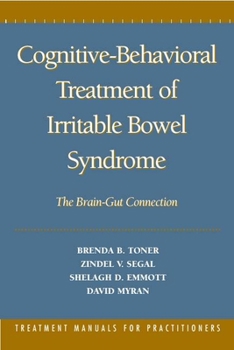Cognitive-Behavioral Treatment of Irritable Bowel Syndrome: The Brain-Gut Connection
Select Format
Select Condition 
Book Overview
Irritable Bowel Syndrome (IBS) is the most common functional gastrointestinal disorder, causing pain, discomfort, and embarrassment to millions. While medically based treatments have demonstrated only limited effectiveness, recent research strongly supports the role of psychosocial factors in both symptom expression and symptom control. This book presents a brief cognitive-behavioral treatment approach that is suitable for use with individuals or groups. Delineating a clear medical rationale, the authors help clinicians both to reduce the stigma associated with IBS and to overcome client resistance to psychological treatment. Effective techniques are outlined for helping clients manage anxiety, anger, and shame; enhance their self-efficacy and stress management skills; and alleviate gastrointestinal distress. Session-by-session guidelines are illuminated by such useful features as sample therapist-client dialogues, lists of important points to cover, troubleshooting tips, and examples of recommended handouts and forms. Also covered in depth are treatment issues specific to women.
Format:Hardcover
Language:English
ISBN:157230135X
ISBN13:9781572301351
Release Date:November 1999
Publisher:Guilford Publications
Length:188 Pages
Weight:0.96 lbs.
Dimensions:0.9" x 6.3" x 9.3"
Customer Reviews
2 ratings
Effective, user-friendly program for IBS
Published by Thriftbooks.com User , 24 years ago
While this book is written for practitioners, it provides information and insight which can be useful for the sufferer of irritable bowl syndrome (IBS) as well. This may be especially true for many of the over 20 million individuals in the US alone who suffer from social anxiety disorder - a fear of being negatively evaluated and humiliated in social situations - who suffer from this painful and embarrassing disorder as well. Given that the diseased-based biomedical model can't adequately account for these gastrointestinal symptoms and their psychological effects, it is gratifying to see an empirically-supported cognitive-behavioral treatment for IBS which is effective.In addition to its gender and social context issues, its comprehensive set of treatment recommendations includes emphasis on coping with shame, anger, assertiveness, self-efficacy, social approval, perfectionism, control, self-nuturance, and performance anxiety. To assist the therapist in facilitating the client's learning, the book also includes recommendations, troubleshooting guides, common problems and myths, case histories, scripts, and client-therapist dialogues.This is an excellent volume on a condition which heretofore has received little attention.
Cognitive Behavior Therapy for Irritable Bowel Syndrome
Published by Thriftbooks.com User , 25 years ago
Written by Brenda Toner and her colleagues, who have worked extensively on psychosocial aspects of Irritable Bowel Syndrome (IBS), this manual provides a thorough, yet accessible, introduction to the current understanding of IBS and cognitive behavioural approaches to its treatment. One of the particularly interesting aspects of the book is the attention paid to gender socialisation and social stigma as factors which may help to explain both the high proportion of female IBS outpatients and some of the central concerns of the patient group. After summarising current research into the biological, psychological and social factors that contribute to the disorder the second half of the book outlines the cognitive behavioural therapy program developed and implemented by the Toronto group. A detailed outline of session themes and session content is included. Case studies and sample scripts are used throughout making this book clear and interesting to read.Beyond its use as a manual to guide health care professionals in the management and treatment of patients with IBS, this book provides a great insight into the nature of the disorder and the impact it has on patient's psychological state and day to day lives.






